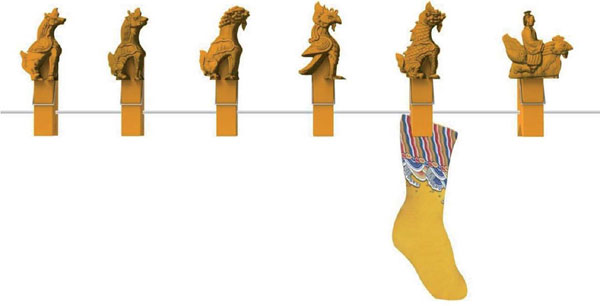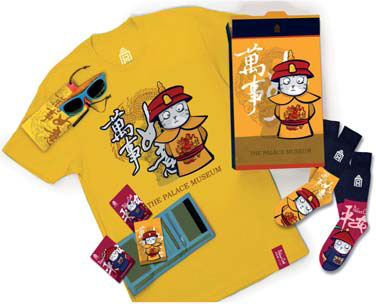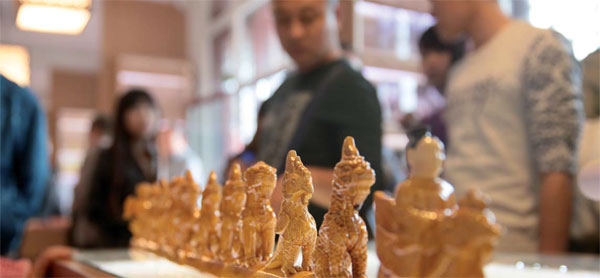Taking a bit of history home

After seeing the Forbidden City's success in selling souvenirs, other museums are getting into the business thanks to new guidelines
It may soon be easier for visitors to China to take "national treasures" home with them, as the Ministry of Culture is encouraging museums to produce more souvenirs.
The ministry announced the move in late May at Beijing's Forbidden City, officially known as the Palace Museum. It follows a similar State Council directive aimed at promoting creativity among cultural heritage institutions.

| Tourists visit a souvenir shop at the Palace Museum in Beijing. Photos Provided to China Daily |
| The Palace museum has a variety of souvenirs, including clips and socks (top), costumes for pet dogs (left) and T-shirts (right). |
It's hoped the ministry guidelines will encourage new technical approaches and improve the design and marketing at museums to enhance the visitor experience.
"One major hurdle has been that public museums can't autonomously allocate the income earned from the sale of souvenirs because they're public institutions," says Wu Jiangbo, director of the ministry's cultural industry department. "But the ministry's announcement means they can now use that income to enhance public services, improve their collections, create better souvenirs and even offer bonuses to designers."
The development of such souvenirs could also become part of the museum evaluation system, he adds.
Ministry officials say the move is being piloted at select museums before being expanded nationwide.
Cultural souvenirs from museums are popular on Chinese social media, which may account for the boom seen at the Forbidden City.
Shan Jixiang, the museum's director, says sales of its more than 8,700 types of souvenirs surpassed 1 billion yuan ($151 million; 135 million euros) last year.
Asked why the museum has such a large range of products, he says: "What matters to a museum is not how many visitors it has, but how close it is to people's daily lives. About 80 percent of souvenirs sold in our stores weren't related to our museum. We wanted to change that situation."
Souvenirs at the Forbidden City now cover almost every aspect of life, including costumes for pet dogs, Shan says. With a smile he adds: "Perhaps we've overdone it a bit."
The total value of souvenir sales last year at 11 key public museums jointly run by provincial and central authorities was just 97 million yuan, according to the State Administration of Cultural Heritage.
Guan Qiang, its deputy director, says the body will draft national rules to guide museums' business operations and enable them to access markets more efficiently.

The first national survey of moveable cultural heritage, which started in 2012, will also likely be completed this year, and Guan says that could further help with the development of cultural souvenirs.
The National Museum of China, also in Beijing, is planning to use cyberspace to create cultural souvenirs. The institution recently teamed up with Alibaba to build a platform to share information on its collections with designers at the e-commerce company to help them come up with product ideas.
"The project will also help to attract investors and solve a problem that many museums face: a lack of money to develop ideas into products," says Li Liusan, the museum's deputy director.
The platform will be open to small museums, which often have excellent collections that have the potential for popular souvenirs but have no expertise to make it happen, he says, adding that an offline business center will be opened in the Shanghai Free Trade Zone to enhance the process.
With the emphasis now on cultural souvenirs, Wu at the Culture Ministry says intellectual property protection will be a priority. "Museum operators should work harder to protect IP when they open up to the market," he says.
Meanwhile, museums will be allowed to become shareholders in corporations using the IP of their collections to develop cultural derivatives, Wu adds.
"We're starting something new," he says. "Of course, as more businesses interact with museums it will create another problem: How to prevent total commercialization and make sure museums are still public institutions. New issues will arise but we will deal with them."
wangkaihao@chinadaily.com.cn
(China Daily European Weekly 07/08/2016 page21)
Today's Top News
- Takaichi must stop rubbing salt in wounds, retract Taiwan remarks
- Millions vie for civil service jobs
- Chinese landmark trade corridor handles over 5m TEUs
- China holds first national civil service exam since raising eligibility age cap
- Xi's article on CPC self-reform to be published
- Xi stresses improving long-term mechanisms for cyberspace governance
































